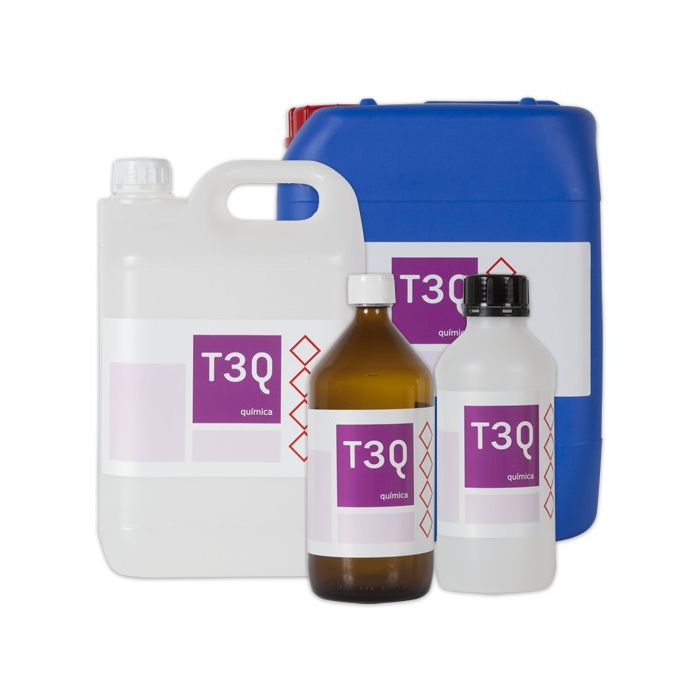Acetone
Acetone
Buy Acetone
At T3Química, we offer you the possibility to buy acetone online in various packaging options, with delivery within 72 hours for in-stock orders. On our website, you will find acetone in the following formats:
- 100 ml container
- 250 ml container
- 500 ml container
- 1-liter container
- 5-liter container
If you need a different type of packaging or special quantities, do not hesitate to contact us directly by email or phone. We customize our packaging according to each customer’s specific needs.
What is Acetone?
Acetone is an organic chemical compound that is liquid, flammable, and volatile. It is characterized by having a sweet and penetrating odor. Chemically, it belongs to the ketone family, and its molecular formula is (CH₃)₂CO.
Acetone is mainly obtained as a byproduct of fat decomposition. It is soluble in water and many organic solvents, which makes it widely used in various fields.
What are the Main Uses of Acetone?
Acetone has a wide range of applications in different industries:
- Chemical and pharmaceutical industry: It is used as a solvent in the manufacturing of chemicals and pharmaceuticals, such as resins, varnishes, medicines, and personal care products.
- Cosmetics industry: It is a common ingredient in nail polishes, nail polish removers, and nail care products.
- Paint and coatings industry: It is used as a solvent for paints, lacquers, and cleaning products.
- Electronics industry: Acetone is used in the cleaning of electronic circuits and the removal of solder residues.
- Textile industry: It is employed in stain removal and fabric cleaning.
Important Aspects of Acetone
While acetone is widely used and safe in many applications, caution is required in handling it due to its flammability. Some important aspects to consider are:
- Storage: It should be kept in a cool, dry, and well-ventilated place, away from heat sources and open flames.
- Safe usage: It is recommended to use gloves and protective goggles when handling acetone to avoid contact with skin and eyes.
- Inhalation hazard: Since acetone is volatile, it is important to work in well-ventilated areas and avoid prolonged inhalation of vapors.
- Responsible use: Acetone should not be ingested, and contact with food or beverages should be avoided.
Frequently Asked Questions
Is acetone flammable?
Yes, acetone is highly flammable, so it should be kept away from heat sources and open flames.
Can it be used to remove nail polish?
Yes, acetone is commonly used as a nail polish remover due to its ability to dissolve and remove polish effectively.
Is it safe to use acetone in the cosmetics industry?
Yes, as long as safety guidelines are followed and it is used in appropriate concentrations. It is recommended to perform sensitivity tests before application.
Does acetone have an odor?
Yes, acetone has a characteristic sweet and penetrating odor.
Can it be used to remove paint stains?
Yes, acetone is effective for removing fresh paint stains, although it is recommended to test it first on a small area to ensure it does not damage the fabric.
Conclusion
Acetone is a versatile solvent with numerous applications in the chemical, pharmaceutical, cosmetics, and textile industries. At T3Química, we pride ourselves on offering high-quality chemical products to meet your needs. If you have more questions about acetone or other products, do not hesitate to contact us. We are here to help you.
Acetone Properties
Boiling and melting points: Acetone has a boiling point of approximately 56°C and a melting point of approximately -95°C.
Solubility: It is soluble in water, alcohol, ether, chloroform, and other common organic solvents.
Density: The density of acetone is approximately 0.79 g/cm³.
Acetone Compatibility
Compatibility with materials: Acetone is compatible with many plastics, rubber, glass, metal, and other common materials. However, it can damage certain types of plastics and coatings, such as polyethylene and PVC.
Incompatibility: It is important to avoid contact of acetone with certain materials, such as expanded polystyrene (polystyrene foam), certain types of plastics, nitrile rubber, and solvent-sensitive materials.
| Pictogramas | Flammable substances (IN), Acute toxicity category 4 (risk when inhaling) (DA) |
|---|

